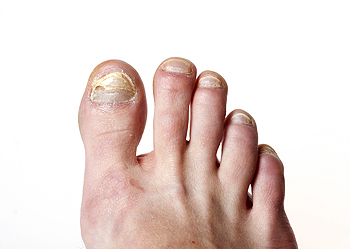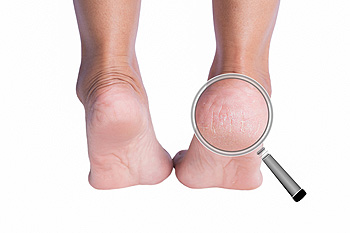Connect With Us
Blog
Items filtered by date: July 2021
When Cracked Heels Become Painful
Heel fissures (cracked heels) that deepen may not only be unattractive, but painful. Left untreated, they may form hardened calluses, bleed, or even become infected. Cracked heels are usually the result of dry skin. Sometimes, this is exacerbated by obesity—which can cause dry skin to stiffen and crack when it is overly stretched. Standing on hard flooring for prolonged periods, as well as wearing poorly fitting or open-back shoes, or having certain foot disorders, psoriasis, eczema, and other medical conditions may also contribute to the development of cracked heels. You can help prevent heel fissures from occurring by keeping your feet hydrated with emollient or humectant moisturizers, limiting your time in the shower or bath, and opting for warm, rather than hot, water. Severely cracked or bleeding heels should be cared for by a podiatrist who can help prevent them from becoming infected.
If the skin on your feet starts to crack, you may want to see a podiatrist to find treatment. If you have any concerns, contact Dr. Richard Silverstein from Union Foot Care. Our doctor can provide the care you need to keep you pain-free and on your feet.
Cracked Heels
It is important to moisturize your cracked heels in order to prevent pain, bleeding, and infection. The reason cracked heels form is because the skin on the foot is too dry to support the immense pressure placed on them. When the foot expands, the dry skin on the foot begins to split.
Ways to Help Heal Them
- Invest in a good foot cream
- Try Using Petroleum Jelly
- Ease up on Soaps
- Drink Plenty of Water
Ways to Prevent Cracked Heels
- Moisturize After Showering
- Skip a Shower
- Keep Shower Water Lukewarm
- Don’t Scrub Your Feet
If you are unsure how to proceed in treating cracked heels, seek guidance from a podiatrist. Your doctor will help you with any questions or information you may need.
If you have any questions, please feel free to contact our office located in Havre de Grace, MD . We offer the newest diagnostic and treatment technologies for all your foot care needs.
When Cracked Heels Become Painful
Heel fissures (cracked heels) that deepen may not only be unattractive, but painful. Left untreated, they may form hardened calluses, bleed, or even become infected. Cracked heels are usually the result of dry skin. Sometimes, this is exacerbated by obesity—which can cause dry skin to stiffen and crack when it is overly stretched. Standing on hard flooring for prolonged periods, as well as wearing poorly fitting or open-back shoes, or having certain foot disorders, psoriasis, eczema, and other medical conditions may also contribute to the development of cracked heels. You can help prevent heel fissures from occurring by keeping your feet hydrated with emollient or humectant moisturizers, limiting your time in the shower or bath, and opting for warm, rather than hot, water. Severely cracked or bleeding heels should be cared for by a podiatrist who can help prevent them from becoming infected.
If the skin on your feet starts to crack, you may want to see a podiatrist to find treatment. If you have any concerns, contact Dr. Richard Silverstein from Union Foot Care. Our doctor can provide the care you need to keep you pain-free and on your feet.
Cracked Heels
It is important to moisturize your cracked heels in order to prevent pain, bleeding, and infection. The reason cracked heels form is because the skin on the foot is too dry to support the immense pressure placed on them. When the foot expands, the dry skin on the foot begins to split.
Ways to Help Heal Them
- Invest in a good foot cream
- Try Using Petroleum Jelly
- Ease up on Soaps
- Drink Plenty of Water
Ways to Prevent Cracked Heels
- Moisturize After Showering
- Skip a Shower
- Keep Shower Water Lukewarm
- Don’t Scrub Your Feet
If you are unsure how to proceed in treating cracked heels, seek guidance from a podiatrist. Your doctor will help you with any questions or information you may need.
If you have any questions, please feel free to contact our office located in Havre de Grace, MD . We offer the newest diagnostic and treatment technologies for all your foot care needs.
Teaching Children How to Care for Their Feet
 It is important for parents to teach their children how to take care of their feet. Children are often fascinated to learn that each of their feet have twenty-six bones, in addition to several muscles, ligaments, and tendons. They understand their feet can feel good when they are washed and dried every day, and when they wear shoes that fit correctly. Babies' feet will get stronger when they can walk barefoot while indoors, due the toes gripping the floor to maintain balance. When the toenails are trimmed, ingrown toenails may be prevented. This is a condition that can cause severe pain and discomfort, and it can make it difficult for children to run and play. If you would like more information about methods on how to teach children the proper way to care for their feet, please consult with a podiatrist.
It is important for parents to teach their children how to take care of their feet. Children are often fascinated to learn that each of their feet have twenty-six bones, in addition to several muscles, ligaments, and tendons. They understand their feet can feel good when they are washed and dried every day, and when they wear shoes that fit correctly. Babies' feet will get stronger when they can walk barefoot while indoors, due the toes gripping the floor to maintain balance. When the toenails are trimmed, ingrown toenails may be prevented. This is a condition that can cause severe pain and discomfort, and it can make it difficult for children to run and play. If you would like more information about methods on how to teach children the proper way to care for their feet, please consult with a podiatrist.
Making sure that your children maintain good foot health is very important as they grow. If you have any questions, contact Dr. Richard Silverstein of Union Foot Care. Our doctor can provide the care you need to keep you pain-free and on your feet.
Keeping Children's Feet Healthy
Having healthy feet during childhood can help prevent medical problems later in life, namely in the back and legs. As children grow, their feet require different types of care. Here are some things to consider...
Although babies do not walk yet, it is still very important to take care of their feet.
Avoid putting tight shoes or socks on his or her feet.
Allow the baby to stretch and kick his or her feet to feel comfortable.
As a toddler, kids are now on the move and begin to develop differently. At this age, toddlers are getting a feel for walking, so don’t be alarmed if your toddler is unsteady or ‘walks funny’.
As your child gets older, it is important to teach them how to take care of their feet.
Show them proper hygiene to prevent infections such as fungus.
Be watchful for any pain or injury.
Have all injuries checked by a doctor as soon as possible.
Comfortable, protective shoes should always be worn, especially at play.
If you have any questions please feel free to contact our office located in Havre de Grace, MD . We offer the newest diagnostic and treatment technologies for all your foot and ankle needs.
Read more about How to Care for Your Child's FeetTeaching Children How to Care for Their Feet
 It is important for parents to teach their children how to take care of their feet. Children are often fascinated to learn that each of their feet have twenty-six bones, in addition to several muscles, ligaments, and tendons. They understand their feet can feel good when they are washed and dried every day, and when they wear shoes that fit correctly. Babies' feet will get stronger when they can walk barefoot while indoors, due the toes gripping the floor to maintain balance. When the toenails are trimmed, ingrown toenails may be prevented. This is a condition that can cause severe pain and discomfort, and it can make it difficult for children to run and play. If you would like more information about methods on how to teach children the proper way to care for their feet, please consult with a podiatrist.
It is important for parents to teach their children how to take care of their feet. Children are often fascinated to learn that each of their feet have twenty-six bones, in addition to several muscles, ligaments, and tendons. They understand their feet can feel good when they are washed and dried every day, and when they wear shoes that fit correctly. Babies' feet will get stronger when they can walk barefoot while indoors, due the toes gripping the floor to maintain balance. When the toenails are trimmed, ingrown toenails may be prevented. This is a condition that can cause severe pain and discomfort, and it can make it difficult for children to run and play. If you would like more information about methods on how to teach children the proper way to care for their feet, please consult with a podiatrist.
Making sure that your children maintain good foot health is very important as they grow. If you have any questions, contact Dr. Richard Silverstein of Union Foot Care. Our doctor can provide the care you need to keep you pain-free and on your feet.
Keeping Children's Feet Healthy
Having healthy feet during childhood can help prevent medical problems later in life, namely in the back and legs. As children grow, their feet require different types of care. Here are some things to consider...
Although babies do not walk yet, it is still very important to take care of their feet.
Avoid putting tight shoes or socks on his or her feet.
Allow the baby to stretch and kick his or her feet to feel comfortable.
As a toddler, kids are now on the move and begin to develop differently. At this age, toddlers are getting a feel for walking, so don’t be alarmed if your toddler is unsteady or ‘walks funny’.
As your child gets older, it is important to teach them how to take care of their feet.
Show them proper hygiene to prevent infections such as fungus.
Be watchful for any pain or injury.
Have all injuries checked by a doctor as soon as possible.
Comfortable, protective shoes should always be worn, especially at play.
If you have any questions please feel free to contact our office located in Havre de Grace, MD . We offer the newest diagnostic and treatment technologies for all your foot and ankle needs.
Do Your Child's Feet Hurt?
Do Your Child's Feet Hurt?
Is Toenail Fungus Contagious?
 Thickened toenails that turn a yellow color can indicate that a toenail fungus has developed. Additional symptoms can include brittle nails, and in severe cases, the nail may turn black, and fall off. The fungus that causes this type of infection lives and thrives in warm and moist places, and is considered to be contagious. These can include public swimming pools, locker rooms, shower room floors, and surrounding areas. Additionally, wearing shoes and socks that are wet may significantly contribute to the onset of toenail fungus. An effective preventive technique is to wear appropriate shoes while in these areas, and it can help to wear shoes and socks that remain dry. If you have signs of a toenail fungus developing, it is suggested that you seek the counsel of a podiatrist who can offer you the right treatments for you.
Thickened toenails that turn a yellow color can indicate that a toenail fungus has developed. Additional symptoms can include brittle nails, and in severe cases, the nail may turn black, and fall off. The fungus that causes this type of infection lives and thrives in warm and moist places, and is considered to be contagious. These can include public swimming pools, locker rooms, shower room floors, and surrounding areas. Additionally, wearing shoes and socks that are wet may significantly contribute to the onset of toenail fungus. An effective preventive technique is to wear appropriate shoes while in these areas, and it can help to wear shoes and socks that remain dry. If you have signs of a toenail fungus developing, it is suggested that you seek the counsel of a podiatrist who can offer you the right treatments for you.
For more information about treatment, contact Dr. Richard Silverstein of Union Foot Care. Our doctor can provide the care you need to keep you pain-free and on your feet.
Toenail Fungus Treatment
Toenail fungus is a condition that affects many people and can be especially hard to get rid of. Fortunately, there are several methods to go about treating and avoiding it.
Antifungals & Deterrence
Oral antifungal medicine has been shown to be effective in many cases. It is important to consult with a podiatrist to determine the proper regiment for you, or potentially explore other options.
Applying foot powder on the feet and shoes helps keep the feet free of moisture and sweat.
Sandals or open toed shoes – Wearing these will allow air movement and help keep feet dry. They also expose your feet to light, which fungus cannot tolerate. Socks with moisture wicking material also help as well.
If you have any questions please feel free to contact our office located in Havre de Grace, MD . We offer the newest diagnostic tools and technology to treat your foot and ankle needs.
Read more about How to Treat Your Toenail FungusIs Toenail Fungus Contagious?
 Thickened toenails that turn a yellow color can indicate that a toenail fungus has developed. Additional symptoms can include brittle nails, and in severe cases, the nail may turn black, and fall off. The fungus that causes this type of infection lives and thrives in warm and moist places, and is considered to be contagious. These can include public swimming pools, locker rooms, shower room floors, and surrounding areas. Additionally, wearing shoes and socks that are wet may significantly contribute to the onset of toenail fungus. An effective preventive technique is to wear appropriate shoes while in these areas, and it can help to wear shoes and socks that remain dry. If you have signs of a toenail fungus developing, it is suggested that you seek the counsel of a podiatrist who can offer you the right treatments for you.
Thickened toenails that turn a yellow color can indicate that a toenail fungus has developed. Additional symptoms can include brittle nails, and in severe cases, the nail may turn black, and fall off. The fungus that causes this type of infection lives and thrives in warm and moist places, and is considered to be contagious. These can include public swimming pools, locker rooms, shower room floors, and surrounding areas. Additionally, wearing shoes and socks that are wet may significantly contribute to the onset of toenail fungus. An effective preventive technique is to wear appropriate shoes while in these areas, and it can help to wear shoes and socks that remain dry. If you have signs of a toenail fungus developing, it is suggested that you seek the counsel of a podiatrist who can offer you the right treatments for you.
For more information about treatment, contact Dr. Richard Silverstein of Union Foot Care. Our doctor can provide the care you need to keep you pain-free and on your feet.
Toenail Fungus Treatment
Toenail fungus is a condition that affects many people and can be especially hard to get rid of. Fortunately, there are several methods to go about treating and avoiding it.
Antifungals & Deterrence
Oral antifungal medicine has been shown to be effective in many cases. It is important to consult with a podiatrist to determine the proper regiment for you, or potentially explore other options.
Applying foot powder on the feet and shoes helps keep the feet free of moisture and sweat.
Sandals or open toed shoes – Wearing these will allow air movement and help keep feet dry. They also expose your feet to light, which fungus cannot tolerate. Socks with moisture wicking material also help as well.
If you have any questions please feel free to contact our office located in Havre de Grace, MD . We offer the newest diagnostic tools and technology to treat your foot and ankle needs.
Elevating the Feet May Help Nighttime Ankle Pain
The function of the ankle is to connect the foot with the leg. Ankle pain can occur after incurring an injury and this can cause severe pain and discomfort. Intense pain can be a result of torn ligaments that link the bones together. Some patients even experience nighttime ankle pain, which can come from bruising and swelling. Existing medical conditions, such as peripheral neuropathy, can possibly be a factor in developing ankle pain at night. This ailment can cause numbness and tingling sensations, and it can be difficult to walk. Additionally, a pinched nerve inside the heel or ankle may contribute significantly to severe ankle pain. Mild relief may be felt when the feet are elevated while sleeping, and it often helps to wear shoes that fit correctly. Ankle pain can be bothersome regardless of its source. It is suggested that you consult with a podiatrist who can effectively diagnose and treat ankle pain.
Ankle pain can have many different causes and the pain may potentially be serious. If you have ankle pain, consult with Dr. Richard Silverstein from Union Foot Care. Our doctor will assess your condition and provide you with quality foot and ankle treatment.
Ankle pain is any condition that causes pain in the ankle. Due to the fact that the ankle consists of tendons, muscles, bones, and ligaments, ankle pain can come from a number of different conditions.
Causes
The most common causes of ankle pain include:
- Types of arthritis (rheumatoid, osteoarthritis, and gout)
- Ankle sprains
- Broken ankles
- Achilles tendinitis
- Achilles tendon rupture
- Stress fractures
- Tarsal tunnel syndrome
- Plantar fasciitis
Symptoms
Symptoms of ankle injury vary based upon the condition. Pain may include general pain and discomfort, swelling, aching, redness, bruising, burning or stabbing sensations, and/or loss of sensation.
Diagnosis
Due to the wide variety of potential causes of ankle pain, podiatrists will utilize a number of different methods to properly diagnose ankle pain. This can include asking for personal and family medical histories and of any recent injuries. Further diagnosis may include sensation tests, a physical examination, and potentially x-rays or other imaging tests.
Treatment
Just as the range of causes varies widely, so do treatments. Some more common treatments are rest, ice packs, keeping pressure off the foot, orthotics and braces, medication for inflammation and pain, and surgery.
If you have any questions, please feel free to contact our office located in Havre de Grace, MD . We offer the newest diagnostic and treatment technologies for all your foot care needs.
Elevating the Feet May Help Nighttime Ankle Pain
The function of the ankle is to connect the foot with the leg. Ankle pain can occur after incurring an injury and this can cause severe pain and discomfort. Intense pain can be a result of torn ligaments that link the bones together. Some patients even experience nighttime ankle pain, which can come from bruising and swelling. Existing medical conditions, such as peripheral neuropathy, can possibly be a factor in developing ankle pain at night. This ailment can cause numbness and tingling sensations, and it can be difficult to walk. Additionally, a pinched nerve inside the heel or ankle may contribute significantly to severe ankle pain. Mild relief may be felt when the feet are elevated while sleeping, and it often helps to wear shoes that fit correctly. Ankle pain can be bothersome regardless of its source. It is suggested that you consult with a podiatrist who can effectively diagnose and treat ankle pain.
Ankle pain can have many different causes and the pain may potentially be serious. If you have ankle pain, consult with Dr. Richard Silverstein from Union Foot Care. Our doctor will assess your condition and provide you with quality foot and ankle treatment.
Ankle pain is any condition that causes pain in the ankle. Due to the fact that the ankle consists of tendons, muscles, bones, and ligaments, ankle pain can come from a number of different conditions.
Causes
The most common causes of ankle pain include:
- Types of arthritis (rheumatoid, osteoarthritis, and gout)
- Ankle sprains
- Broken ankles
- Achilles tendinitis
- Achilles tendon rupture
- Stress fractures
- Tarsal tunnel syndrome
- Plantar fasciitis
Symptoms
Symptoms of ankle injury vary based upon the condition. Pain may include general pain and discomfort, swelling, aching, redness, bruising, burning or stabbing sensations, and/or loss of sensation.
Diagnosis
Due to the wide variety of potential causes of ankle pain, podiatrists will utilize a number of different methods to properly diagnose ankle pain. This can include asking for personal and family medical histories and of any recent injuries. Further diagnosis may include sensation tests, a physical examination, and potentially x-rays or other imaging tests.
Treatment
Just as the range of causes varies widely, so do treatments. Some more common treatments are rest, ice packs, keeping pressure off the foot, orthotics and braces, medication for inflammation and pain, and surgery.
If you have any questions, please feel free to contact our office located in Havre de Grace, MD . We offer the newest diagnostic and treatment technologies for all your foot care needs.
Blog Archives
- July 2024
- June 2024
- May 2024
- April 2024
- March 2024
- February 2024
- January 2024
- December 2023
- November 2023
- October 2023
- September 2023
- August 2023
- July 2023
- June 2023
- May 2023
- April 2023
- March 2023
- February 2023
- January 2023
- December 2022
- November 2022
- October 2022
- September 2022
- August 2022
- July 2022
- June 2022
- May 2022
- April 2022
- March 2022
- February 2022
- January 2022
- December 2021
- November 2021
- October 2021
- September 2021
- August 2021
- July 2021
- June 2021
- May 2021
- April 2021
- March 2021
- February 2021
- January 2021
- December 2020
- November 2020
- October 2020
- September 2020
- August 2020
- July 2020
- June 2020
- May 2020
- April 2020
- March 2020
- February 2020
- January 2020
- December 2019
- November 2019
- October 2019
- September 2019
- August 2019
- July 2019
- June 2019
- May 2019
- April 2019
- March 2019
- February 2019
- January 2019
- December 2018
- November 2018
- October 2018
- September 2018
- August 2018
- July 2018
- June 2018
- May 2018
- April 2018
- March 2018
- February 2018
- January 2018
- December 2017
- November 2017
- October 2017
- September 2017
- August 2017
- July 2017
- June 2017
- May 2017
- April 2017
- March 2017
- February 2017
- January 2017
- December 2016
- November 2016
- October 2016
- September 2016
- August 2016
- July 2016
- June 2016
- May 2016



